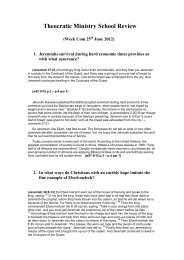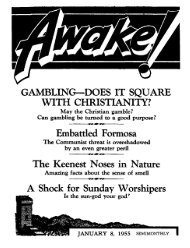1964 Awake! - Theocratic Collector.com
1964 Awake! - Theocratic Collector.com
1964 Awake! - Theocratic Collector.com
You also want an ePaper? Increase the reach of your titles
YUMPU automatically turns print PDFs into web optimized ePapers that Google loves.
WHAT IS \\\\\\\\\1"<br />
LOOKED 1<br />
TO·ASIII '<br />
11111111111111111111 II<br />
o SCRUTINY<br />
Nof the foundation<br />
of modern-day religion would be<br />
thorough unless we examined the authority<br />
to which the religions look. Does not the<br />
quality of the foundation upholding a religion<br />
depend upon the authority to which<br />
it looks? Does not a weak authority mean<br />
a weak foundation? Hence a strong authority<br />
is needed, and not only must such a<br />
sound, strong authority be looked to, but<br />
it must be the authority; that is, its principles<br />
must actually be put into practice<br />
by its adherents.<br />
There are many forms of modern-day<br />
religion whose adherents vary from a<br />
small handful to thousands and even millions.<br />
To what authority do they look for<br />
support of their way of worship? How<br />
strong is that authority? Do they live by<br />
it? Does it give them a firm foundation,<br />
a good reason for their adherents putting<br />
trust in them? Let us examine what<br />
modem-day religion looks to as authority.<br />
Tradition as Authority<br />
It is frankly admitted that many groups<br />
rely heavily on tradition, which may be<br />
information, opinions, beliefs or customs<br />
handed down by word of mouth or by example.<br />
Traditions have their value; traditions<br />
in dress, eating habits and architecture<br />
have enriched men with variety. But<br />
APRIL !2, <strong>1964</strong><br />
not all tradition has proved beneficial.<br />
Though customs and information handed<br />
down in religion can be helpful, they often<br />
tend to be inaccurate. Especially with the<br />
lapse of time details of happenings are forgotten<br />
or distorted.<br />
It has<br />
been well said<br />
tha t not the<br />
least misfortune<br />
in a prominent<br />
falsehood is the<br />
fact that tradition<br />
is apt to repeat it<br />
for truth.<br />
We note, as an example, that The Catholic<br />
Encyclopedia, Vol. 15, page 6, says:<br />
"It is an old tradition that Jesus Christ<br />
was born on 25 December." But is that<br />
tradition accurate? The Bible does not give<br />
the exact date but does indicate Jesus'<br />
birth was before wintertime, while the<br />
shepherds were still out on their fields at<br />
night. It points to about October 1.· Tradition<br />
handed down December 25 because<br />
that date coincides with the pagan Roman<br />
Saturnalia and the birthday of the pagan<br />
sun-god Mithras. Thus tradition has perpetuated<br />
a falsehood.<br />
Tradition can also prove tyrannical.<br />
Speaking as the voice of men long dead,<br />
tradition may lay its "dead hand" on the<br />
living; and instead of serving from its place<br />
of vantage as a guide, it may take over<br />
the helm, leading one in the wrong direction.<br />
It may thus block progress, as in the<br />
case of creeds that are considered closed<br />
and not open to reason. Though it should<br />
be well known that man must check tradition<br />
by reason, too often man checks reason<br />
by tradition.<br />
It is little wonder, then, that some clergymen<br />
bemoan the fact that their religion<br />
rests too heavily on tradition, as did Bish-<br />
* For detailed proof see The Walchtower of December<br />
15. 1957, pp. 742, 743,<br />
7




